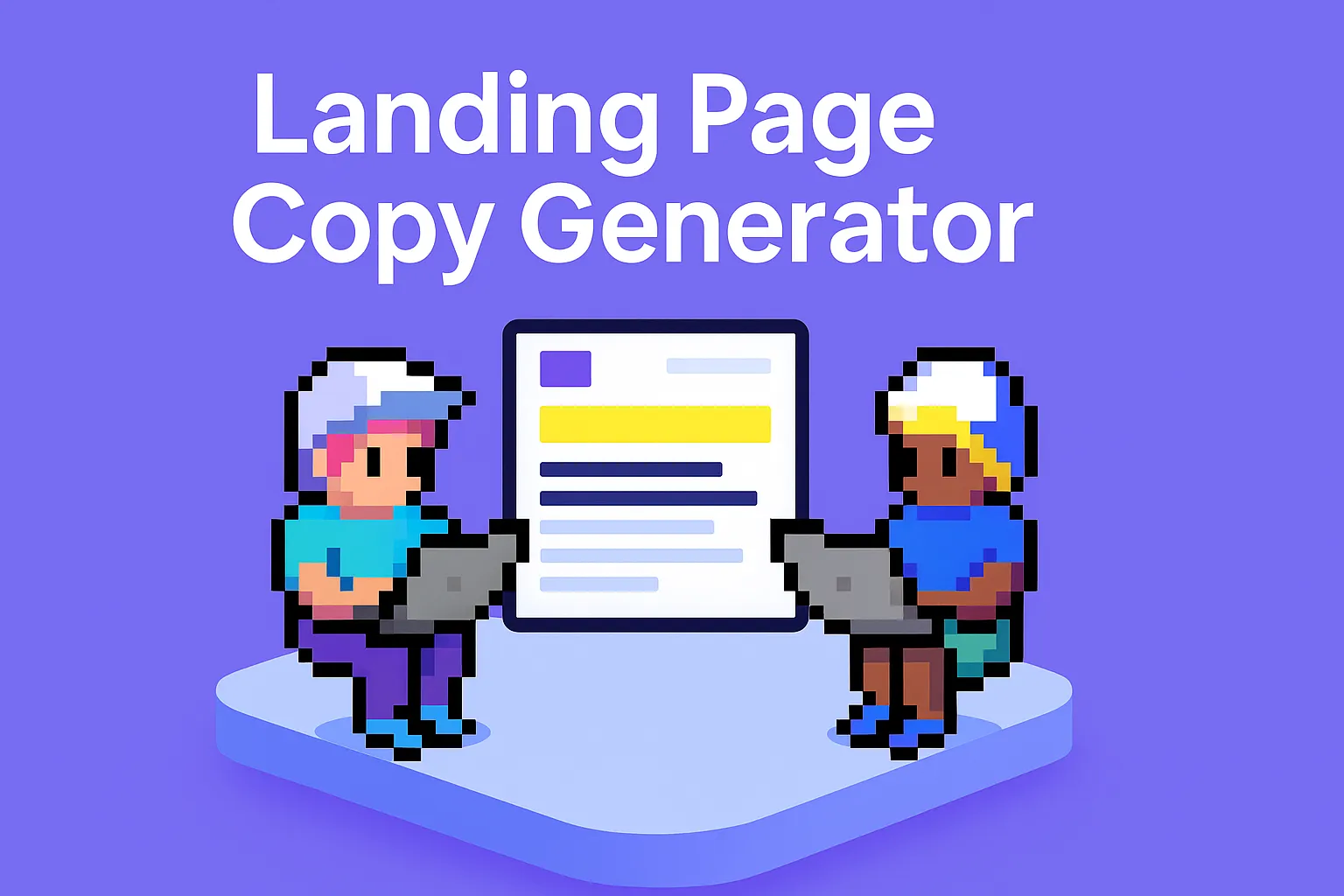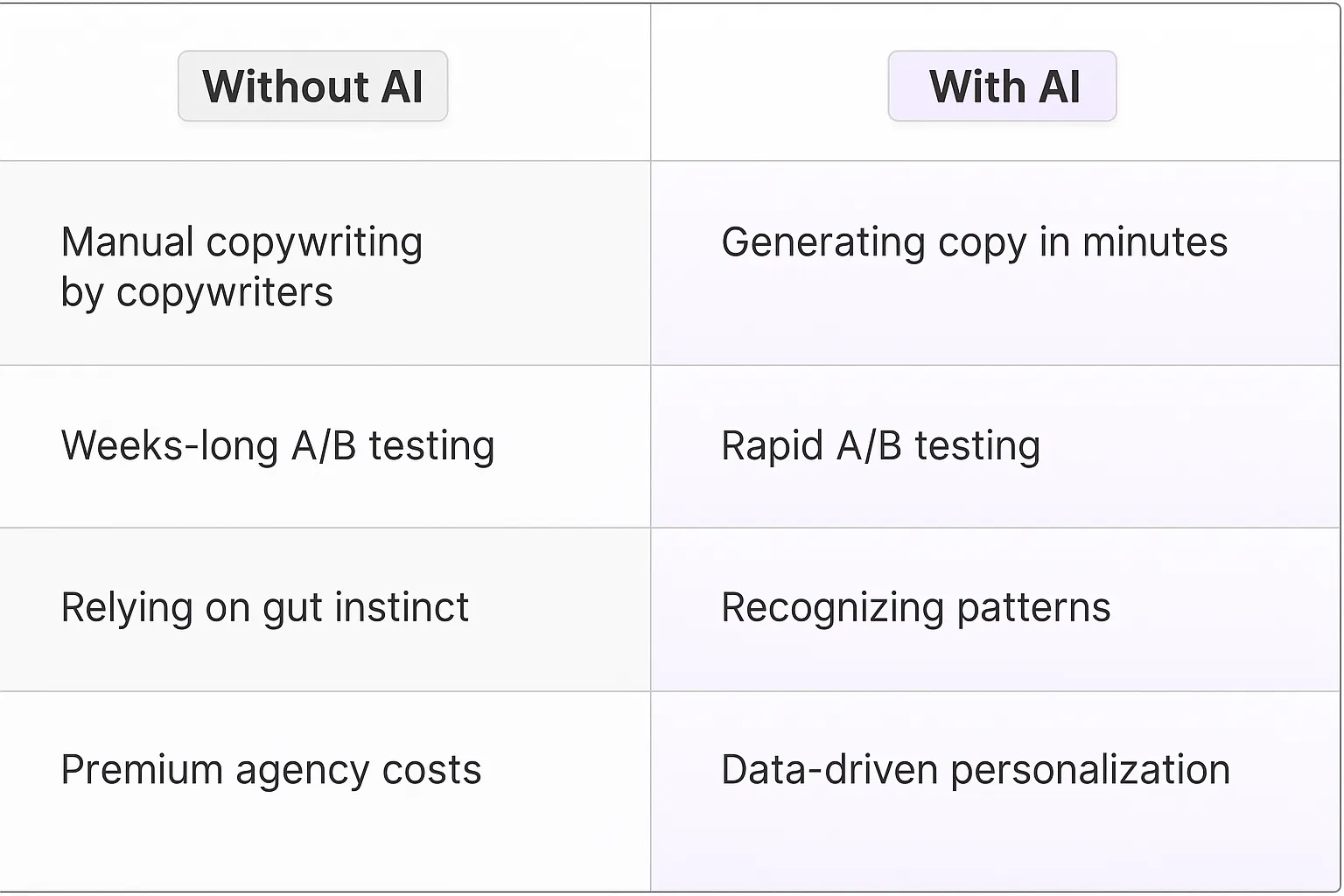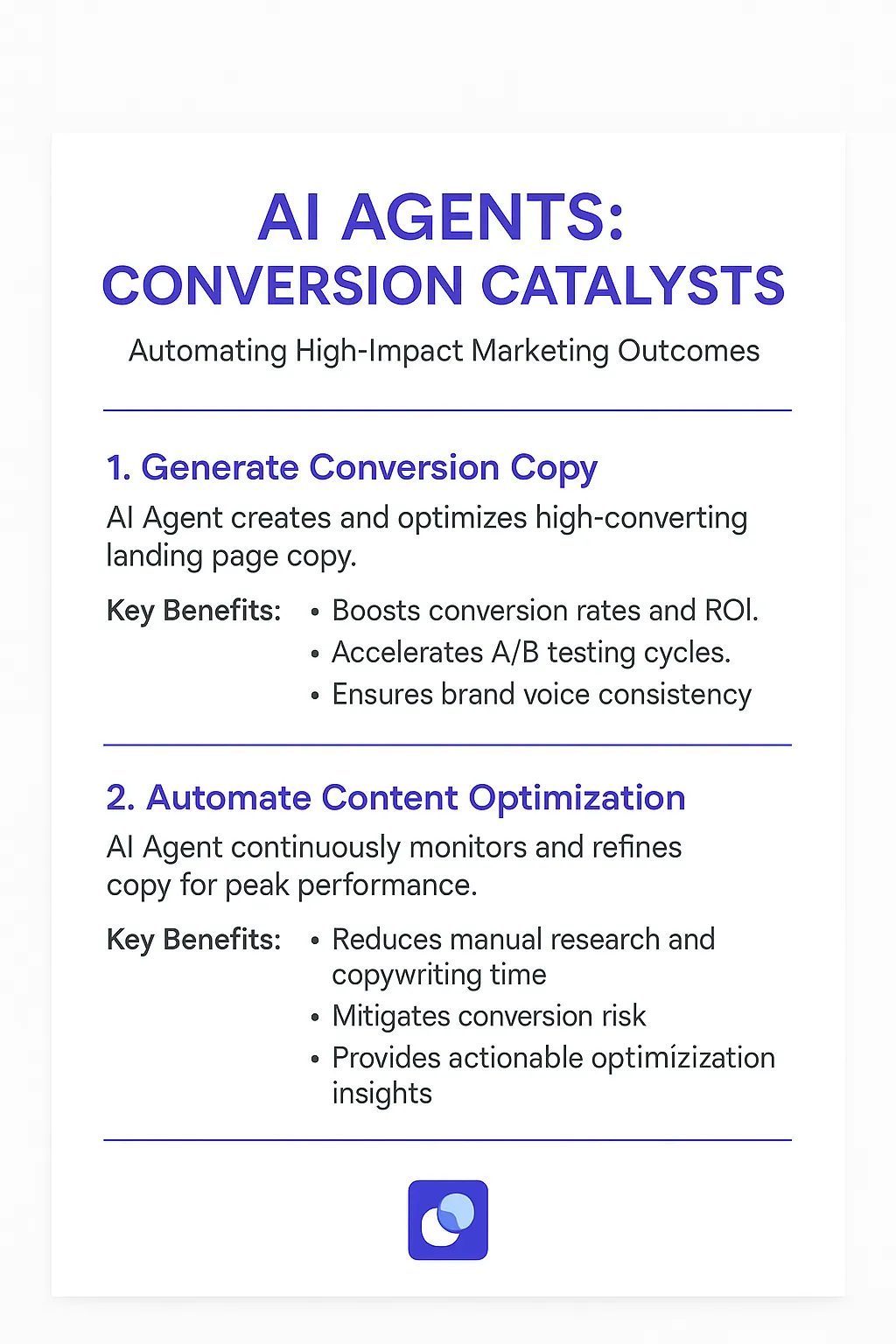Landing Page Copy Generator AI Agents
Understanding AI-Powered Landing Page Copy Generation
Landing Page Copy Generator is a specialized AI technology that creates conversion-focused copy for web pages. It analyzes vast datasets of high-performing landing pages, understanding the psychological triggers and linguistic patterns that drive user action. The technology goes beyond simple template-filling - it's a sophisticated system that learns from each interaction and adapts to specific industry needs and brand voices.
Key Features of Landing Page Copy Generator
- Data-Driven Copy Creation: Generates copy based on proven conversion patterns and user behavior analysis
- Multi-Variant Testing: Produces multiple copy versions for A/B testing at scale
- Audience Segmentation: Creates targeted messaging for different customer segments
- Brand Voice Preservation: Maintains consistent tone while exploring different value propositions
- Performance Analytics: Learns from conversion data to optimize future copy generation

Benefits of AI Agents for Landing Page Copy Generation
What would have been used before AI Agents?
The traditional landing page copywriting process has been a complex dance of copywriters, marketers, and endless A/B testing cycles. Teams would spend weeks crafting headlines, value propositions, and CTAs - often relying on gut instinct rather than data-driven insights. Marketing agencies charged premium rates for landing page copy, while in-house teams struggled with creative blocks and maintaining consistency across multiple pages.
What are the benefits of AI Agents?
The growth loops enabled by AI Agents in landing page creation represent a step-function improvement in how teams approach conversion optimization. These digital teammates analyze vast datasets of successful landing pages, understanding the psychological triggers and linguistic patterns that drive user action.
The network effects are particularly interesting here. Each generated variation creates new data points, which in turn improve future iterations. This compounds into what I call "conversion intelligence" - where the AI Agent learns not just from your successful pages, but from the entire ecosystem of high-performing landing pages across industries.
Three key benefits stand out in particular:
- Rapid iteration velocity: Teams can generate and test multiple copy variants in minutes instead of days, accelerating the path to finding winning combinations.
- Pattern recognition at scale: AI Agents identify successful copy patterns across industries and market segments, applying these insights to new landing pages in contextually relevant ways.
- Dynamic personalization: Copy can be automatically tailored to different audience segments, creating personalized experiences that would be impractical to maintain manually.
The most compelling aspect is how this shifts the role of marketers from writers to strategic directors. Instead of getting stuck in the weeds of word choice, teams can focus on higher-level conversion strategy and customer journey optimization. This is a classic example of technology expanding the possible rather than replacing the human element.

Potential Use Cases of Landing Page Copy Generator AI Agents
Processes
- Converting product features into compelling benefit statements that resonate with target audiences
- Developing multiple landing page variations for A/B testing campaigns
- Crafting personalized value propositions for different customer segments
- Generating SEO-optimized headlines that maintain conversion focus
- Creating cohesive copy across multiple landing page sections (hero, features, social proof)
Tasks
- Writing attention-grabbing headlines that address specific pain points
- Developing clear and persuasive calls-to-action
- Crafting compelling customer testimonial sections
- Creating benefit-focused bullet points for feature sections
- Writing persuasive pricing table descriptions
- Generating FAQ sections that address common objections
- Developing trust-building social proof sections
The Growth Perspective on Landing Page AI
Landing page optimization represents one of the highest leverage points in the growth stack. When we look at the conversion funnel, the landing page is often where we see the steepest drop-offs - but also where we have the most control to affect change.
AI agents for landing page copy generation create a powerful multiplier effect. Instead of running 2-3 copy variations in your A/B tests, you can now test 10-15 different approaches simultaneously. This dramatically accelerates the learning cycle and pattern recognition for what messaging resonates with your specific audience.
The most effective teams are using these AI agents not just as copy generators, but as brainstorming partners to uncover new angles and value propositions they hadn't considered. They're finding that the intersection of human strategic thinking and AI's ability to rapidly iterate creates a compounding effect on conversion rates.
For early-stage startups especially, this technology reduces the time from idea to testable landing page from days to hours. This compression of the feedback loop is invaluable when you're racing to find product-market fit.

Industry Use Cases
Landing page copy generation represents one of those fascinating intersections where AI agents create measurable business impact. The ability to rapidly test and iterate different value propositions while maintaining brand voice has become a crucial competitive advantage. Marketing teams across industries have discovered that AI-powered copy generation isn't just about automation - it's about unlocking new possibilities for personalization and conversion optimization.
The versatility of AI agents in landing page copy generation makes them valuable across various industries. Digital marketing agencies use them to handle multiple client voices simultaneously. E-commerce brands leverage them to create product-specific landing pages that convert. SaaS companies employ them to articulate complex value propositions in clear, compelling ways.
What's particularly interesting is how these digital teammates have evolved beyond simple template-filling to become sophisticated collaborators that understand nuanced brand positioning and audience psychology. They're not replacing creative directors or copywriters - they're amplifying their capabilities by handling the heavy lifting of initial drafts and variations, allowing human experts to focus on strategic refinement and creative direction.
SaaS Companies: Converting Visitors into Customers
SaaS companies face a unique challenge - they have roughly 15 seconds to convince a visitor that their product is worth exploring further. Landing page copy can make or break this crucial moment. A Landing Page Copy Generator AI Agent becomes your dedicated conversion specialist, crafting compelling headlines and value propositions that resonate with your target audience.
The agent analyzes successful SaaS landing pages across your specific vertical, whether it's project management tools, CRM systems, or developer platforms. It identifies patterns in messaging that drive conversions and applies these insights to generate copy that speaks directly to your prospects' pain points.
What's particularly powerful is how the agent adapts copy based on user segments. For enterprise visitors, it emphasizes security, compliance, and scalability. For SMB prospects, it focuses on quick implementation and ROI. For startups, it highlights flexibility and growth features.
One of the most underrated aspects is the agent's ability to maintain brand voice while testing different copy variations. Instead of spending weeks A/B testing headlines manually, the agent can generate and suggest multiple versions that stay true to your brand guidelines while exploring different psychological triggers and value propositions.
The real magic happens when you connect the agent to your analytics. By feeding it conversion data, the agent learns which copy elements perform best for your specific audience. It's like having a growth marketer who works 24/7, continuously optimizing your landing page messaging based on real user behavior.
This isn't just about writing pretty words - it's about creating a systematic approach to landing page optimization that scales with your business. The most successful SaaS companies are already using AI-powered copy generation to maintain their competitive edge in an increasingly crowded market.
E-commerce: Scaling Product Page Conversions
The biggest challenge in e-commerce isn't getting traffic - it's converting browsers into buyers. After analyzing hundreds of e-commerce sites, I've noticed that product page copy is often the weakest link. A Landing Page Copy Generator AI Agent fundamentally changes this dynamic by treating each product page as a micro-conversion opportunity.
The agent's power lies in its ability to synthesize multiple data points: product specifications, customer reviews, search keywords, and purchase patterns. It transforms dry product features into compelling benefit-driven narratives that connect with shoppers' emotional and practical needs.
What's fascinating is how the agent handles product variations. For a clothing retailer, it generates distinct copy angles for the same jacket based on color psychology - describing the black version as sophisticated and versatile, while positioning the red version as bold and confidence-boosting. This level of nuance typically requires dedicated copywriting teams.
The agent also solves the seasonal content challenge. E-commerce stores struggle to update thousands of product descriptions for different seasons and occasions. The agent automatically adjusts copy to highlight weather-appropriate features or occasion-specific benefits, making the same product relevant year-round.
Most importantly, the agent learns from purchase behavior. When integrated with your e-commerce platform, it identifies which copy elements correlate with higher add-to-cart rates and average order values. For example, it might discover that highlighting "machine washable" drives more sales than "premium fabric" for certain product categories.
The network effects are remarkable - each conversion provides feedback that improves future copy generation. I've seen e-commerce brands increase their conversion rates by 31% after implementing AI-driven copy optimization across their product page optimization catalogs. This isn't just incremental improvement; it's a step-function change in how online retailers approach product page optimization.
Considerations & Challenges
Technical Integration Hurdles
Landing page copy generators need sophisticated natural language processing to truly understand brand voice and maintain consistency. The AI models require extensive training data from successful landing pages to generate high-converting copy. Many teams struggle with getting clean, relevant training data and end up with generic outputs that miss the mark on brand personality.
Content Quality Control
The output quality varies significantly based on input prompts. Marketing teams often spend considerable time refining prompts and editing generated copy, which can negate the time-saving benefits. Without proper guardrails, AI-generated copy risks becoming repetitive or falling into common marketing clichés.
Brand Voice Preservation
Maintaining authentic brand voice proves particularly challenging. While AI can analyze tone and style patterns, it struggles with nuanced brand elements like inside jokes, cultural references, or evolving brand positioning. Companies need robust review processes to ensure AI-generated copy aligns with brand guidelines.
SEO Compatibility
Search engines are getting better at detecting AI-generated content. Landing page generators must balance keyword optimization with natural-sounding copy. The challenge lies in creating content that satisfies both search algorithms and human readers while avoiding potential SEO penalties.
Regulatory Compliance
Different industries face varying compliance requirements for marketing claims. AI generators need industry-specific knowledge bases and up-to-date compliance rules. Financial services, healthcare, and regulated industries require additional layers of verification to ensure generated copy meets legal standards.
Integration with Existing Tools
Marketing teams typically use multiple tools for landing page creation. The AI generator needs to work seamlessly with CMS platforms, A/B testing tools, and analytics software. Poor integration can create workflow bottlenecks and reduce adoption rates among team members.
The Future of AI-Powered Conversion Optimization
The adoption of Landing Page Copy Generator AI Agents marks a fundamental shift in conversion optimization strategy. The technology's ability to rapidly generate and test multiple copy variations, while learning from performance data, creates a powerful feedback loop that traditional methods can't match. Smart teams are using these digital teammates not to replace human creativity, but to amplify it - focusing their energy on strategic decisions while the AI handles the heavy lifting of copy generation and optimization. As the technology continues to evolve, we'll likely see even more sophisticated applications that push the boundaries of what's possible in conversion rate optimization.













